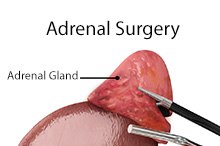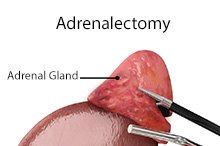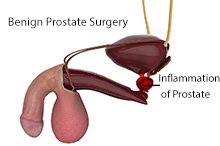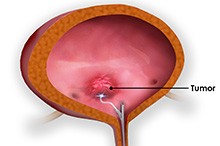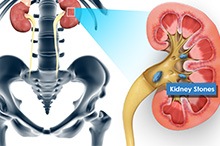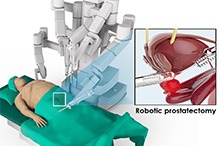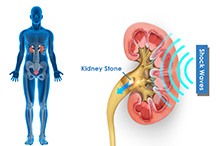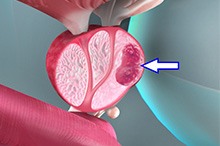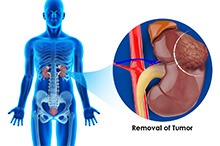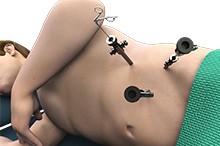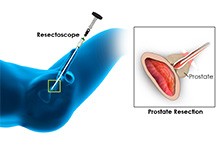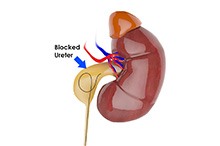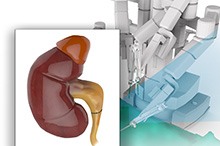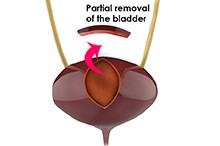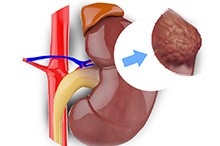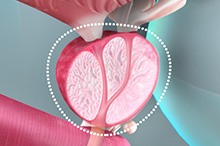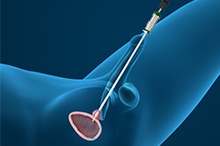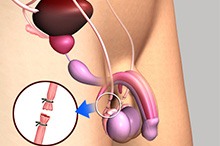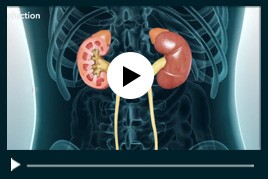Procedures
Adrenal Surgery
Adrenal surgery involves removal of one or both adrenal glands. The adrenal glands are paired endocrine glands located above each kidney. The surgical procedure of adrenal gland removal is known as adrenalectomy and is indicated in patients with benign or malignant tumour like mass within the adrenal glands. Adrenalectomy can be performed either with laparoscopic technique or open surgery.
Adrenalectomy
Adrenal glands are two triangle-shaped glands located above the kidneys, which secrete hormones that control your metabolism, blood pressure, chemical levels in blood and usage of glucose. Laparoscopic adrenalectomy is a minimally invasive procedure used to remove an adrenal gland affected with a tumour.
Benign Prostate Surgery
The prostate is a bi-lobed gland situated below the bladder in males and surrounds a part of the urethra (tube that passes urine outside the body). The prostate may sometimes show a benign enlargement, called benign prostatic hyperplasia (BPH), as part of the aging process, which can compress the urethra and obstruct the flow of urine.
Bladder Tumour Biopsy and Resection
Blood in the urine, painful and frequent urination, and low back pain are common urinary disorder symptoms that may be associated with bladder cancer. When you visit the clinic with these complaints,
Circumcision
Circumcision is the surgical removal of some or the entire foreskin covering the head or glans (rounded tip) of the penis. The procedure is performed for cultural or religious reasons or for health reasons.
Kidney Surgery
Kidney surgery may be recommended for various conditions that affect the kidneys including urinary obstruction, stones, tumours, cysts, injury, infection and other kidney diseases. These conditions often lead to pain and difficulty
Robotic Prostatectomy
Prostate cancer is a malignant cancer that can spread to the lymph nodes, bones and other parts of the body. It is the most common cause of death in elderly men over 75 years of age.
Lithotripsy
Kidney stones are small, hard deposits that can develop in the kidneys. Lithotripsy, often referred to as Extracorporeal shock wave lithotripsy (ESWL), is the most common procedure for the management
Localized Prostate Cancer Treatment
Localised prostate cancer is cancer that is restricted within the prostate gland and has not spread to other parts of your body. The cancer can be treated by various methods, which include active surveillance, medications, radiation therapy and chemotherapy.
Minimally Invasive Urological Surgery
Traditional urologic surgeries are performed through large incisions for proper access and visualisation of the surgical site. Advances in technology now allow your doctor to treat various urological conditions such
Nephrectomy
The procedure is performed under general anaesthesia and takes about 3 hours. Your doctor makes a long incision just below the rib. One of the ribs may have to be removed to easily access the kidney. The kidney is separated from the surrounding muscles,
Nephroureterectomy
Laparoscopic nephroureterectomy is a surgical technique that involves the removal of the kidney and ureter. It is indicated for the treatment of transitional cell carcinoma (cancer occurring in the tissue lining these organs).
Prostate Resection
The prostate gland is an organ found in men, surrounding the neck of the urinary bladder. The gland grows with age, but if it grows too big, it can exert pressure on the urethra (tube that drains urine),
Pyeloplasty
Pyeloplasty is a surgery which helps in the removal of blockages in the ureter. The urinary system consists of the kidneys, ureters and urinary bladder. The kidneys purify blood to form urine which passes through
Robotic Dismembered Pyeloplasty
The kidneys filter the blood to produce urine, which passes through the renal pelvis, a funnel shaped area on each kidney, to tubes called ureters that lead to the bladder. A blockage can sometimes occur at the
Robotic Partial Cystectomy
Cystectomy is the surgical removal of the bladder, anda standard procedureto treat invasive bladder cancer. A partial cystectomy is surgery performed to remove only a portionof the bladder, while the rest of the bladder functions normally.
Robotic Partial Nephrectomy
A nephrectomy is the surgical removal of the kidney. A partial nephrectomy or kidney-sparing procedure involves the removal of only the unhealthy portion of the kidney, leaving healthy tissue intact. It is indicated for kidney cancer and severely diseased or damaged areas of the kidney.
Robotic Radical Prostatectomy
Prostate cancer is a malignant cancer that can spread to the lymph nodes, bones and other parts of the body. It is the most common cause of death in elderly men over 75 years of age.
TURP
Transurethral resection of the prostate gland is carried out primarily to relieve obstruction. It is not the type of operation that is usually carried out in the treatment of prostate cancer. In a great majority of cases,you will be given a spinal anaesthetic.
Vasectomy
Vasectomy is a minor surgical procedure in which the vas deferens, a thin tube that stores and transports sperm is cut and then tied or sealed so that the sperm can no longer get into the semen. It is a permanent method of birth control in men.

 Menu
Menu